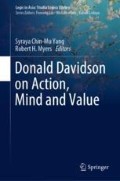Abstract
In his later works, Davidson argues that an agent cannot have any propositional thought if it has never interacted with another agent in a certain way. This is later known as the triangulation argument. However, this argument is very controversial and not many philosophers accept it. One of the reasons is that there is no consensus on how exactly the argument goes. In this chapter, I try to reformulate this argument, and special attention is paid to the methodological considerations on relevant similarity, which I believe, are often being overlooked in current literature. A tentative modification of the kind of interactions required is also given.
This chapter is in its final form, and it is not submitted for publication anywhere else.
Access this chapter
Tax calculation will be finalised at checkout
Purchases are for personal use only
Notes
- 1.
- 2.
- 3.
It should be emphasized that when Davidson discusses KA, he is considering a very thin sense of normativity, that is, the standard of correct application of a concept and the truth condition of a thought. Another way to ask this question would therefore be: If mere dispositions cannot explain the correct or incorrect application of a concept, or the truth or falsity of thought, what else can?
- 4.
See also Blackburn (1984).
- 5.
- 6.
One can also construct a triangulation scenario in terms of an agent with his imagined self or one in his expectation, the situation is, I believe, essentially the same.
References
Blackburn, S. (1984). The individual strikes back. Synthese, 58(3), 281–301.
Boghossian, P. A. (1989). The rule-following considerations. Mind, 98(392), 507–549.
Bridges, J. (2006). Davidson’s transcendental externalism. Philosophy and Phenomenological Research, 73(2), 290–315.
Briscoe, R. E. (2007). Communication and rational responsiveness to the world. Pacific Philosophical Quarterly, 88(2), 135–159.
Burge, T. (2010). Origins of objectivity. Oxford: Oxford University Press.
Davidson, D. (1995). The problem of objectivity. Tijdschrift voor filosofie, 203–220.
Davidson, D. (1999). The emergence of thought. Erkenntnis, 51, 7–17.
Davidson, D. (2001a). Externalisms. In P. Kotatko, P. Pagin, & G. Segal (Eds.), Interpreting Davidson (pp. 1–16). Standford CA: CSLI Publications.
Davidson, D. (2001b). What thought requires. In J. Branquinho (Ed.), The foundations of cognitive science. Oxford: Clarendon Press. Reprinted in Problems of rationality (pp. 135–149). Oxford: Oxford University Press. 2004.
Davidson, D. (2004). Problems of rationality. Oxford: Clarendon Press.
Davidson, D. (2006). The perils and pleasures of interpretation. In E. Lepore & B. Smith (Eds.), The Oxford handbook of philosophy of language (pp. 1057–1068). Oxford: Oxford University Press.
Forbes, G. (1983). Scepticism and semantic knowledge. Proceedings of the Aristotelian Society, 84, 223–237.
Gilbert, M. (1989). On social facts. New Jersey: Princeton University Press.
Gilbert, M. (2014). Joint commitment: How we make the social world. New York, NY: Oxford University Press.
Glüer, K. (2006). Triangulation. In E. Lepore & B. Smith (Eds.), The Oxford handbook of philosophy of language (pp. 1006–1019). Oxford: Oxford University Press.
Koťátko, P., Pagin, P., & Segal, G. (2001). Interpreting Davidson. Stanford, CA.: CSLI Publications.
Kripke, S. A. (1982). Wittgenstein on rules and private language: An elementary exposition. Oxford: Oxford University Press.
Lepore, E., & Ludwig, K. (2005). Donald Davidson: Meaning, truth, language, and reality: Oxford: Clarendon Press.
Lepore, E., & Smith, B. C. (2006). The Oxford handbook of philosophy of language. Oxford: Oxford University Press.
Montminy, M. (2003). Triangulation, objectivity and the ambiguity problem. Crítica, 35, 25–48.
Myers, R. H., & Verheggen, C. (2016). Donald Davidson’s triangulation argument: A philosophical inquiry. London: Routledge.
Verheggen, C. (2007). Triangulating with Davidson. The Philosophical Quarterly, 57(226), 96–103.
Verheggen, C. (2013). Triangulation. In E. Lepore & K. Ludwig (Eds.), A companion to Donald Davidson (pp. 456–471). Chichester: Wiley Blackwell.
Author information
Authors and Affiliations
Corresponding author
Editor information
Editors and Affiliations
Rights and permissions
Copyright information
© 2021 Springer Nature Singapore Pte Ltd.
About this chapter
Cite this chapter
Leong, W.C. (2021). Methodological Considerations in the Triangulation Argument. In: Yang, S.CM., Myers, R.H. (eds) Donald Davidson on Action, Mind and Value. Logic in Asia: Studia Logica Library. Springer, Singapore. https://doi.org/10.1007/978-981-15-7230-2_9
Download citation
DOI: https://doi.org/10.1007/978-981-15-7230-2_9
Published:
Publisher Name: Springer, Singapore
Print ISBN: 978-981-15-7229-6
Online ISBN: 978-981-15-7230-2
eBook Packages: Religion and PhilosophyPhilosophy and Religion (R0)

